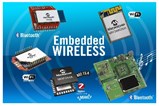Microchip Expands Embedded Wireless Portfolio With New Bluetooth, Wi-Fi And ZigBee Products

Expansion Includes PIC32 Bluetooth Digital Audio Kit, Feature-Rich Wi-Fi Modules, IEEE 802.15.4 & Proprietary Radio, and XBee Compatible Bluetooth and Wi-Fi Modules
Microchip Technology Inc., a leading provider of microcontroller, mixed-signal, analog and Flash-IP solutions, recently announced a major expansion of its embedded-wireless portfolio from the DESIGN West/Embedded Systems Conference in San Jose. The Bluetooth additions include the PIC32 Bluetooth Audio Development Kit, featuring modules, stacks and CODECs, and XBee footprint-compatible socket modules with integrated stacks. The new Wi-Fi offerings comprise IEEE 802.11b/g Wi-Fi modules with Microchip’s feature-rich and free source-code TCP/IP stack running on a PIC microcontroller for greater configurability, as well as XBee footprint-compatible socket modules with integrated stacks for ease of use. Microchip is also adding a low-power 2.4 GHz radio that supports—for the first time in one chip—both the IEEE 802.15.4 and proprietary data rates (from 125 kbps to 2 Mbps), including the ZigBee, MiWi and other proprietary protocols.
View a brief presentation on these new products: http://www.microchip.com/get/3FSJ
“Whether you are designing wireless networks optimized for Bluetooth, Wi-Fi, ZigBee or proprietary protocols, Microchip has you covered,” said Steve Caldwell, director of Microchip’s Wireless Products Division.
There are many wireless-network designs that need to operate with very low power consumption. Examples include battery-powered home and industrial automation wireless-sensor mesh networks, as well as ZigBee RF4CE-standard-based remote controls. Microchip’s next-generation, 2.4 GHz IEEE 802.15.4 MRF24XA transceiver radio provides a very low operating voltage range of 1.5 to 3.6V and receive power consumption of only 13 mA, which enables years of battery life. This is also Microchip’s first radio that can support both the IEEE 802.15.4 and proprietary data rates (from 125 kbps to 2 Mbps), including the ZigBee, MiWi and other proprietary protocols.
Some designers want an easy way to migrate their 802.15.4 designs to either Wi-Fi or Bluetooth, in order to make them accessible from smart phones and tablets, or to add Internet connectivity. This includes applications such as wireless sensor networks, remote monitoring/control and measurement, and M2M cable replacements for home, commercial and industrial networks. The RN XV series of Wi-Fi and Bluetooth socket modules provide agency-certified, drop-in connectivity for any XBee socket. To simplify designs, the stacks are integrated on the module, configured via simple ASCII commands, and can easily connect to any MCU via a serial interface.
Other designers want to add more extensible Wi-Fi functionality, such as a complete Web server and email, via a configurable source-code TCP/IP stack that is resident on one of many PIC microcontrollers. The new low-power and agency-certified MRF24WG0MA/MB modules connect at all IEEE 802.11b/g data rates, up to 54 Mbps, and are Microchip’s first to support a sustained throughput of 5 Mbps. This provides a footprint-compatible migration path for users of Microchip’s existing Wi-Fi modules who need greater speed or increased access-point compatibility, along with more features.
Bluetooth digital audio is rapidly expanding in high-volume applications such as accessories for smart phones and tablets, as well as audio sound bars. To meet this demand, designers need a cost-effective development platform that provides high-quality audio. Microchip’s 32-bit PIC32 microcontrollers provide a high-performance platform for developing quality digital-audio playback and accessories. The new PIC32 Bluetooth Audio Development Kit builds on Microchip’s existing stack-integrated Bluetooth audio module with a new low-cost, agency-certified Bluetooth HCI transceiver module based on a standard radio, AVRCP and A2DP Bluetooth profiles tailored for the PIC32, as well as both standard and advanced audio CODECs such as SBC, AAC and MP3. Additionally, this kit can be used with Microchip’s existing Made for iPod and Android stacks. Together, these elements provide a versatile and powerful development platform with a high level of customization and flexibility.
Pricing & Availability
The MRF24XA 2.4 GHz IEEE 802.15.4 transceiver is sampling today in a 32-pin QFN package. Pricing starts at $1.89 each in 1,000-unit quantities. It is supported by the MRF24XA PICtail/PICtail Plus Daughter Board (part # AC164152-1, $24.95), which is expected to be available in May.
The XBee footprint-compatible, 20-lead RN41XVC and RN42XVP Bluetooth socket modules, as well as the RN171XVW, RN171XVS and RN171XVU Wi-Fi socket modules, are all available today, starting at $14.56 each in 1,000-unit quantities. These socket modules are supported by the Evaluation Kit for RN XV Series (part # RN-XV-EK1, $24.95), which is available now.
The 36-pin MRF24WG0MA and MRF24WG0MB Wi-Fi modules are available today at a cost of $18.75 each, in 1,000-unit quantities. These Wi-Fi modules can be evaluated using the Wi-Fi G Demo Board (part # DV102412, $50.00) and MRF24WG0MA PICtail/PICtail Plus Daughter Board (part # AC164149, $35), both of which are available now.
The PIC32 Bluetooth Audio Development Kit (part # DV320032), is available now via Microchip’s Early Adopter Program, and is expected to be widely available this summer. Contact any Microchip sales representative if you are interested in joining the early-adopter program for this kit.
For additional information, contact any Microchip sales representative or authorized worldwide distributor, or visit Microchip’s Web site at http://www.microchip.com/get/J2XU. To purchase products mentioned in this press release, go to microchipDIRECT or contact one of Microchip’s authorized distribution partners.
About Microchip Technology
Microchip Technology Inc. is a leading provider of microcontroller, mixed-signal, analog and Flash-IP solutions, providing low-risk product development, lower total system cost and faster time to market for thousands of diverse customer applications worldwide. Headquartered in Chandler, Arizona, Microchip offers outstanding technical support along with dependable delivery and quality. For more information, visit http://www.microchip.com/get/JJSW.
